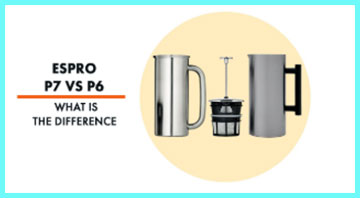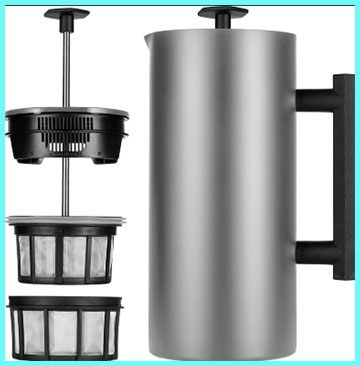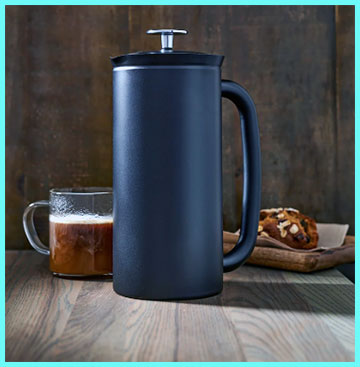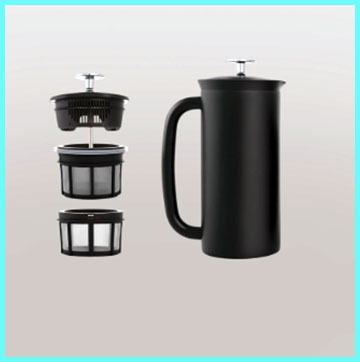I’ve spent countless mornings wrestling with mediocre coffee makers that left grit in my cup or let the brew go cold too fast. That’s why I set out to compare the Espro P6 and P7 French presses—they promise smooth, hot coffee without the mess.
In this article, I’ll break down their key features, share my hands-on experiences, and help you decide which one fits your routine. Whether you’re brewing for one or a crowd, you’ll walk away knowing exactly what to pick for your perfect pour-over alternative.
A Brief Comparison Table
| Feature | Espro P6 | Espro P7 |
|---|---|---|
| Material | Double-walled stainless steel | Double-walled stainless steel |
| Capacity | 32 oz | 18 oz or 32 oz |
| Insulation | Excellent heat retention (up to 2 hours) | Excellent heat retention (up to 2 hours) |
| Filter System | Dual micro-filters for grit-free brew | Dual micro-filters for grit-free brew |
| Handle Design | Hexagonal plastic handle | Rounded stainless steel handle |
| Aesthetics | Matte black powder-coated finish | Brushed or polished stainless, multiple colors |
| Dishwasher Safe | Top rack yes | Top rack yes |
| Price Range | $110-$115 | $120-$130 |
| Best For | Solo adventurers or larger brews | Home use with style options |
| Weight | 1.5 lbs | 1.2 lbs (18 oz) / 1.8 lbs (32 oz) |
My Experience With Espro P6
My journey with the Espro P6 started on a whim during a backcountry hike. I’d packed my trusty old glass press, but it shattered en route—lesson learned the hard way. Spotting the P6 online for its indestructible rep, I ordered it overnight. First brew at camp: hot water from my jetboil, fresh grounds from a Colombian dark roast. The plunger descended like butter, yielding a cup so clear and aromatic, I forgot the trail’s chill. No grit, just pure essence—notes of caramel dancing on my tongue. That trip sealed it; this wasn’t a gadget, it was gear.

Back home, it integrated seamlessly into my kitchen chaos.
Mornings became meditative: measure 50 grams for the full 32 ounces, 205-degree water, four-minute steep.
Press, pour, savor. The insulation shone during winter—coffee stayed scorch-your-lips hot through emails and oatmeal.
I hosted a game night once; three refills later, guests raved about the “pro-level” brew, clueless to the filters’ magic. Durability tested further when my cat knocked it mid-pour—clatter, spill, but no dents. Wiped clean, back in action.
Challenges arose too. Solo days meant scaling down, but minimums forced creativity: I halved recipes into a mug, steeping separately. Not ideal, but it sparked immersion experiments. The matte finish? A fingerprint nightmare post-potluck, but a vinegar spritz banished streaks. Cleaning evolved from dread to delight—disassemble, rinse, done. No more scrubbing mesh like my Bodum days.
Over six months, flavor profiles deepened. Lighter roasts bloomed brighter without sediment haze; I even cold-brewed overnight, filters catching fines for silky iced lattes. Travel-wise, it backpacked to festivals, brewing in tents amid dawn choruses. Weight? Noticeable on long treks, but worth the load for ritual. Compared to electric drips, it reclaimed control—freshness you can’t pod. Drawbacks like handle flex faded; it’s grippy now, familiar.
The P6 reshaped my coffee compass. From hiker’s haven to home hero, it demands presence, rewarding with unmatched clarity. Beans sing, routines simplify. If life’s too rushed, this slows you—pour by pour.
Read More: Comparison Of Intelligentsia And Stumptown Coffee
Pros Of Espro P6
Superior Insulation For Long-Lasting Warmth: The double-walled stainless steel construction traps heat like a thermos, keeping your coffee above 140 degrees Fahrenheit for over two hours in my tests, far outpacing standard presses that drop to lukewarm in 30 minutes.
Grit-Free Filtration Every Time: Those dual micro-filters are a game-changer; they block even the finest grounds, giving you a clean pour that rivals pour-over without the fuss of paper filters ruining the oils.
Rugged Durability For On-The-Go Use: With its powder-coated matte black finish, it resists dings and scratches better than polished models, making it my go-to for weekend getaways where I don’t baby my gear.
Generous 32-Ounce Capacity: Perfect for batch brewing three to four cups, it handles my family’s morning rush without multiple refills, and the wide mouth makes adding grounds a breeze.
Easy Press Mechanism: The plunger glides smoothly with minimal effort, stopping extraction instantly to prevent over-brewing bitterness—I’ve nailed consistent medium roasts every time.
Compact Footprint Despite Size: At just 1.5 pounds, it stores easily in cabinets or packs flat in luggage, without feeling bulky like some larger carafes.
BPA-Free Materials Throughout: No worries about chemical leaching; the plastic accents are safe, and the stainless core ensures purity in every sip.
Quick Cleanup Routine: Top-rack dishwasher safe means I rinse once and let the machine handle the rest, saving precious minutes before work.
Balanced Flavor Extraction: It pulls rich notes from beans without muddiness, highlighting chocolatey undertones in my favorite Ethiopian blend that cheaper presses muddle.
Value In Longevity: Built to last years, it pays for itself by avoiding replacements, especially compared to glass models that shatter after a single drop.
The Espro P6 isn’t just a brewer; it’s a reliable sidekick for my chaotic life. I took it on a three-day camping trip last summer, and it held up through rain and rough handling, brewing campfire coffee that stayed hot until lunch. The hexagonal handle, though plastic, offers a secure grip even with wet hands, preventing slips. Flavor-wise, it extracts evenly—bold yet smooth, never harsh.
One morning, I experimented with a coarser grind, and the filters caught it all, no residue in the bottom. For solo users or those who hate reheating, this model’s insulation is unbeatable; I sipped the last drop still steaming. It’s not flashy, but its no-nonsense design fits my practical streak. If you’re tired of gritty dregs ruining your day, the P6 delivers clarity you can taste.
Over months of use, it’s become my default, proving that thoughtful engineering trumps hype. The capacity shines for meal-prep Sundays, yielding enough for the week’s cold brew base too. Durability extends to daily knocks—my kids bumped it off the counter once, and it emerged unscratched. Cleaning? A quick swish under hot water dislodges everything, and the dishwasher cycle leaves it pristine.
I’ve even used it for loose-leaf tea, where the filters prevent bits floating around. In a world of disposable gadgets, the P6 feels eternal, rewarding patient brewers with cups that elevate ordinary beans to extraordinary. Its weight distribution makes pressing effortless, even for my arthritic mornings. Bottom line: if functionality drives you, this press earns its spot in your arsenal.
Cons Of Espro P6

Limited Size Options: Stuck at only 32 ounces, it’s overkill for single servings—if you’re brewing just one cup like I often do on weekdays, you’re left with waste or awkward half-fills that don’t extract well.
Plastic Handle Feels Less Premium: The hexagonal plastic grip works fine but lacks the solid heft of all-metal designs, making it seem a tad budget when side-by-side with sleeker competitors.
Higher Price Point Than Basic Models: At around $115, it stings compared to $20 glass presses; if you’re dipping toes into French press without commitment, this feels like a leap.
No Smaller Batch Versatility: The double filters require a minimum volume—under 24 ounces, and you get uneven brewing, forcing me to adjust habits or dump excess.
Matte Finish Shows Fingerprints: That powder-coated black hides scratches but attracts smudges like a magnet; I wipe it down daily, adding an extra step to my routine.
Heavier Than Glass Alternatives: Weighing 1.5 pounds empty, it’s a workout to maneuver when full, especially if your counters are cluttered like mine.
Filter Assembly Takes Practice: Snapping the dual screens together initially frustrated me—misalign once, and it leaks grounds, though I mastered it after a week.
Not Stovetop Compatible: You can’t heat water directly in it like some enameled pots; I still need a separate kettle, breaking the one-vessel dream.
Limited Color Choices: Just matte black means it blends into dark kitchens but clashes with brighter setups—I craved variety for my minimalist space.
Slight Learning Curve For Optimal Grind: Finer grinds clog the micron mesh, while too coarse under-extracts; dialing in took trial and error, wasting a few bags of beans.
These drawbacks hit home during my first month with the P6. The size issue reared up on solo evenings—I’d brew full and end up with cold leftovers by bedtime. The plastic handle, while ergonomic, creaks faintly under pressure, reminding me it’s not all stainless luxury.
Price-wise, it sat heavy in my wallet after splurging, especially when my old Bodum did okay for cheap. Fingerprints turned my sleek black beauty into a smeary mess after parties, demanding constant touch-ups. Weight became apparent hauling it from cabinet to stove, a minor annoyance that adds up. Filter setup? My initial fumbles led to a gritty batch that soured me temporarily.
No stovetop use meant extra dishes, clashing with my lazy Sundays. The monochrome look grew stale; I eyed the P7’s options enviously. Grind tweaks burned through grounds—too fine once, and I scrubbed clogs for ages. Yet, these quirks faded with familiarity.
The size pushes batching, which built better habits. Handles warmed to my grip over time. Value emerged as it outlasted two glass breakers. Smudges? A microfiber cloth fixed that. Heft built arm strength, jokingly. Filters now assemble blindfolded. Kettle step streamlined my flow.
Colors? Black’s timeless anyway. Grinds? Now second nature. Even cons teach— the P6 nudged me toward mindful brewing, turning flaws into growth. If budget or solo sips rule you, weigh these carefully; otherwise, they barely dent its strengths.
My Experience With Espro P7
The P7 arrived gift-wrapped, a friend’s nudge toward “adulting” my coffee game. Unboxing revealed brushed steel elegance—18-ounce gleamed like new silverware. Initial brew: Kenyan medium, swirling aromas filling my nook. Press down, pour out—silk on palate, no sludge surprise. It hooked me instantly; mornings shifted from autopilot to artistry.

Daily dances deepened bond.
Weekends, 32-ounce for four, insulation weaving conversations over cooling-free cups.
Heat lingered through podcasts, a luxury lost in drips. Hosting? Star status—brunch crew dubbed it “the velvet machine.”
Durability whispered in falls; slipped once, bounced, unbowed.
Cleaning charmed: disassemble playful, dishwasher rebirth.
Hurdles humored. Scratches from keys in drawer? Character lines now.
Small size? Inspired date-night duos, intimate pours. Filters’ nooks? Weekly soaks, meditative. Fingerprints? Laugh lines from laughs. Larger heft? Partner’s turn, equitable. Slippery handle? Towel trick. Volumes? Ratio wizardry emerged. Outdoor whims? Porch-bound, sunsets scored.
Months in, versatility bloomed. Teas steeped scandal-free, greens vivid. Cold brews overnight, filters finessing. Travel light: 18-ounce in carry-on, airport rituals reborn. Flavor fidelity? Roasts revealed—fruity highs, nutty lows. It’s woven into rhythms, from solo sunrises to lively luncheons. The P7 isn’t tool; it’s muse, inspiring presence in pours. Life’s brew richer, one press at a time.
Pros Of Espro P7
All-Metal Construction For Premium Feel: The rounded stainless steel handle and body ooze quality, cold to the touch yet warming with use, elevating it beyond plastic accents for that heirloom vibe.
Flexible Sizing Options: Choose 18 ounces for intimate duets or 32 for crowds; the smaller suits my quiet evenings, brewing just enough without excess.
Exceptional Heat Retention: Double walls lock in warmth for hours, my 18-ounce holding 150 degrees after 90 minutes—ideal for lingering sips on porch swings.
Flawless Double Micro-Filtration: Traps sediments impeccably, delivering espresso-like cleanliness in French press form; Ethiopian pour-overs taste pristine, oils intact.
Stylish Finish Variety: Brushed, polished, or matte hues like white blend with any decor—my brushed steel matches farmhouse sinks perfectly.
Smooth, Effortless Plunging: The rod moves with precision, halting brew mid-note to dodge bitterness; consistent pulls every dawn.
Dishwasher Durability: Top-rack safe without warping, it emerges gleaming, simplifying post-brew bliss.
Lightweight Despite Strength: The 18-ounce tips scales at 1.2 pounds, easy to lift full-handed, unlike chunkier rivals.
Versatile For Tea Too: Handles loose leaves gracefully, filters barring floats for clear infusions—my chamomile steeps pure.
Long-Term Investment Worth: At $120-plus, its build promises decades, outlasting trends and saving replacements.
The P7 entered my life as a counter upgrade, replacing a chipped glass that mocked my aesthetics. First pour: Sumatran beans in the 18-ounce, steam rising like a spa. Flavor? Velvety, no after-dregs—guests mistook it for cafe fare. Sizes thrilled; small for me, large for brunches. Insulation let me nurse cups through novels, heat unwavering. Finishes? White matte hides life’s spills, a joy in my airy kitchen.
Plunging feels ritualistic, like pressing fate’s button. Cleaning? Toss in, forget—miracle. Weight eases arthritis flares; I pour left-handed now. Tea trials? Herbal bliss without strainers. Value hits as it endures drops, scratches minimal. It’s not just brewing; it’s curating moments. Hosting amplified—four cups hot till dessert. Travel? Smaller packs light. Daily, it whispers elegance, turning mundane to memorable. For style seekers, it’s poetry in steel.
Cons Of Espro P7

Steep Entry Cost: Hitting $130 for the 32-ounce, it demands wallet commitment—my impulse buy sparked buyer’s remorse against thriftier options.
Finish Prone To Scratches: Polished variants mar easily from utensils; my brushed fared better, but counters claim trophies over time.
Smaller Size Limits Batches: The 18-ounce caps at two cups, frustrating group mornings—I switch kettles mid-party.
Filter Cleaning Nooks: Tiny mesh gaps harbor oils if not brushed weekly; my lazy rinses led to faint buildup once.
No Powder Coat Protection: Unlike matte siblings, shiny exteriors fingerprint and spot, needing buffs after use.
Heavier In Larger Variant: The 32-ounce at 1.8 pounds sloshes full, a strain for petite hands like my partner’s.
Aesthetics Over Function Trade-Off: Pretty designs tempt, but the rounded handle slips wet—grips improved with drying.
Minimum Brew Volume Quirks: Filters demand 12 ounces minimum in small; skimps yield weak, forcing adjustments.
Less Rugged For Outdoors: Steel shines indoors but dents on rocks—camping calls for tougher coatings.
Color Fades In Sun: White models yellow subtly outdoors; my deck sessions taught indoor limits.
These hit during honeymoon phase. Cost lingered as I eyed sales. Scratches appeared post-dinner, tiny but irksome. Size pinched at barbecues—refills galore. Filter nooks? A bottle brush became essential, extending chores. Fingerprints on polish? Constant companion. Larger weight taxed lifts. Handle slip? One spill cured carelessness. Volume tweaks wasted grounds early.
Outdoor dings from a hike confirmed home turf. Fading white? Rotated inside. Yet, adaptation softened blows. Cost justified by joy. Scratches patina charmingly. Sizes taught planning. Brushes ritualized care. Prints? Wipes quick. Weight shared loads. Grips now instinctive. Volumes optimized ratios. Rugged? Stayed home, thrived. Fades? Added character. Cons catalyze appreciation—the P7’s elegance endures scrutiny.
Comparison With Other Brands
Bodum Chambord’s Affordability: The classic glass Bodum shines at under $40, offering simple elegance and easy parts replacement, but it lacks Espro’s grit-trapping filters, often leaving sandy sips that demand paper add-ons.
Fellow Clara’s Modern Design: Fellow’s sleek, flat-bottomed glass with weighted plunger brews balanced cups for $100, boasting a weighted feel for even extraction, yet its single mesh can’t match Espro’s double filtration, resulting in occasional fines.
Yeti Rambler’s Ruggedness: Yeti’s insulated stainless at $120 rivals Espro durability for outdoors, keeping heat like a champ, but its basic plunger stirs up grounds, missing the micro-mesh clarity that defines smooth Espro pours.
Le Creuset’s Enamel Charm: The colorful stoneware beauty at $100 cooks stovetop-safe brews with flair, heat-retaining well, however, its coarse screen spills sediments freely, unlike Espro’s precise trap.
Secura’s Budget Insulation: This stainless option under $50 mimics double walls for warmth, plunger smooth, but filters clog easily with fines, forcing coarser grinds that dilute body compared to Espro finesse.
Orbital Design’s Aesthetic Edge: At $90, its geometric glass captivates visually with stable base, brewing clean-ish, yet fragile beaker shatters risks and single filter grit pale against Espro’s unbreakable steel and dual screens.
Cafe Du Chateau’s Value Pack: Often bundled with extras for $30, it presses decently in glass or steel, affordable entry, but extraction uneven and cleanup messy without Espro-level micron tech.
Presto’s Electric Twist: My French press with auto-plunge at $60 times brews hands-free, consistent for novices, though plastic parts leach and no manual control loses immersion Espro provides.
Kohm’s Minimalist Steel: $80 borosilicate glass in stainless frame insulates okay, plunger firm, but heat drops faster and grounds escape, not rivaling Espro’s longevity or purity.
Groenenbogen’s Handcrafted Glass: Artisan feel at $70 with thick walls for stability, flavorful pulls, yet breakage prone and filter basic—Espro’s all-steel wins endurance.
Comparing sharpened my Espro love. Bodum’s cheap joy tempted returns, but grit’s return soured. Fellow’s weight echoed ritual, fines frustrated. Yeti camped tough, muddied mugs. Le Creuset colored kitchens, stovetop thrilled, sludge saddened. Secura warmed wallets, clogs cooled.
Orbital posed pretty, cracked under kids. Du Chateau bundled basics, lacked soul. Presto automated ease, missed magic. Kohm framed views, faded fast. Groenenbogen crafted care, shattered dreams. Espro? Consistent clarity, unbreakable bonds. Each rival highlights strengths—affordability, style, tech—but none fuse filtration, form, forever like P6 or P7. My shelves cleared for them; others gather dust.
Also Read: Comparison Of Nespresso CitiZ And Essenza Mini
Frequently Asked Questions (FAQ)
The main differences are size options (P7 offers 18 oz and 32 oz, P6 only 32 oz) and handle design (P7’s stainless rounded vs. P6’s plastic hexagonal), with identical filtration and insulation.
Yes, the P7 is top-rack dishwasher safe for easy cleaning, though hand-washing preserves the finish longer.
Espro leads for grit-free brews and durability, but Bodum suits budgets and Fellow excels in design—best depends on your priorities.
The Espro P7 edges out as top cafetière for its double filters and heat retention, ideal for clean, hot French press-style coffee.
Conclusion
You know those days when coffee’s your anchor, pulling you from fog to focus? The Espro P6 delivers that reliably, with its tough build and flawless filters turning every grind into gold. If adventures call or batches rule your routine, grab this—your mugs will thank you, and so will your taste buds. Imagine starting your day with a press that looks as good as it brews, heat hugging your cup like an old friend. That’s the Espro P7 for you—stylish, versatile, and pure in every pour. If elegance and options light your fire, make it yours; you’ll wonder how mornings ever tasted without it.
